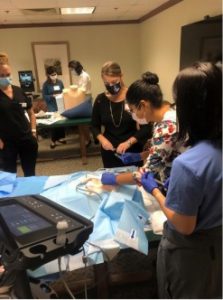Internal Medicine Tyler Residency Curriculum
Residents will rotate through a “4 + 2” curriculum, which is a block schedule composed of three different resident teams. For each team, a four-week inpatient block is accompanied by two weeks of ambulatory time. The curriculum has been developed to optimize resident education and well-being. It allows for focused time both in the hospital and in the ambulatory setting as well as dedicated time for lectures and didactics while minimizing distractions to learning. Additionally, it provides “golden weekends” throughout the year that can be used in planning for personal time. While the early portion of training is focused more on foundational internal medicine experiences, as residents progress through their training, they will have increased time allotted for elective rotations. Residents will also participate in a quality improvement curriculum and conduct a quality improvement or research project during their training under the guidance of a faculty mentor.
Sample Rotations
PGY 1
| Block | Weeks |
| Continuity Clinic/Ambulatory | 2 |
| Wards | 4 |
| Continuity Clinic/Ambulatory | 2 |
| ICU | 4 |
| Continuity Clinic/Ambulatory | 2 |
| Wards Night Float |
3 1 |
| Continuity Clinic/Ambulatory | 2 |
| Emergency | 4 |
| Continuity Clinic/Ambulatory | 2 |
| Wards | 4 |
| Continuity Clinic/Ambulatory | 2 |
| ICU | 4 |
| Continuity Clinic/Ambulatory | 2 |
| Wards | 2 |
| Night Float | 2 |
| Continuity Clinic/Ambulatory | 2 |
| Cardiology | 4 |
| Continuity Clinic/Ambulatory | 2 |
| Wards | 4 |
PGY 2
| Block | Weeks |
| Continuity Clinic/Ambulatory | 2 |
| Wards | 4 |
| Continuity Clinic/Ambulatory | 2 |
| ICU | 4 |
| Continuity Clinic/Ambulatory | 2 |
| Elective | 4 |
| Continuity Clinic/Ambulatory | 2 |
| Neurology | 4 |
| Continuity Clinic/Ambulatory | 2 |
| Wards | 4 |
| Continuity Clinic/Ambulatory | 2 |
| ICU | 4 |
| Continuity Clinic/Ambulatory | 2 |
| Elective | 3 |
| Night Float | 1 |
| Continuity Clinic/Ambulatory | 2 |
| Cardiology | 4 |
| Continuity Clinic/Ambulatory | 2 |
| Night Float | 2 |
PGY 3
| Block | Weeks |
| Continuity Clinic/Ambulatory | 2 |
| Wards | 4 |
| Continuity Clinic/Ambulatory | 2 |
| ICU | 4 |
| Continuity Clinic/Ambulatory | 2 |
| Elective | 4 |
| Continuity Clinic/Ambulatory | 2 |
| Elective | 4 |
| Continuity Clinic/Ambulatory | 2 |
| Wards | 4 |
| Continuity Clinic/Ambulatory | 2 |
| ICU | 4 |
| Continuity Clinic/Ambulatory | 2 |
| Elective | 3 |
| Night Float | 1 |
| Continuity Clinic/Ambulatory | 2 |
| Cardiology | 4 |
| Continuity Clinic/Ambulatory | 2 |
| Night Float | 2 |
Night Float
Residents will each have a total of three weeks of night float during each year of their training which will be spread out over the course of the academic year. During night float rotations, residents will provide cross coverage for patients who are on the internal medicine teaching services as well as admit patients to these teaching services, while being supervised by in house nighttime attending physicians.
Overnight Call
Residents will participate in night call during their internal medicine ward and intensive care unit rotations. Overnight call on the ward rotation averages one night per inpatient ward block, and overnight call on the intensive care unit will be every fourth night during the block. The night float team will provide cross coverage and help perform admissions for the resident teaching services.
Conferences and Lectures
Residents will have the opportunity to learn from a variety of educational conferences and didactic sessions, including the dedicated core curriculum lecture series provided by our experienced faculty covering the essential topics within internal medicine. Leading off this Core Curriculum Lecture Series, each academic year is our “Back to the Basics” series of introductory lectures preparing interns for the year and providing a time of review for the residents on these foundational topics. Other educational lectures include:
- Afternoon Report
- Grand Rounds
- Core Curriculum Lectures Series
- Journal Club
- Case Conference
- Patient Safety Conference
- Quality Improvement Workshop
- Communication Skills Workshop
- Board Review
- Point of Care Ultrasound
- Procedural Simulation

Mentoring Program
Residents are assigned a faculty mentor with whom they will meet throughout each year of their training to assist in providing guidance for their training experience as well as for career plans upon completion of training, helping the resident to develop professionally to fulfill their maximal potential during the training experience and beyond.
Vacation
Residents receive vacation time annually based on the UT System vacation policy which includes a minimum of 15 days of vacation during the academic year which can be taken during approved rotations.